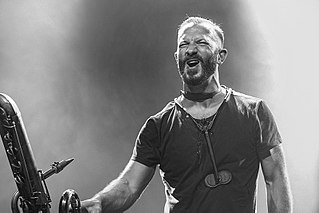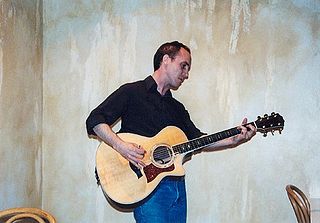A Quote by Colin Stetson
I was also thinking about isolation on an evolutionary scale as well, like when you think of an island like Madagascar where things are free to evolve unfettered by outside powers. That starts to reach into the underlying narrative, which is more of a literal story that I used as a construct to build songs around.
Related Quotes
If there is one thing I think I have accomplished, it's that I always thought of myself as a very literal songwriter, and as I look at some of those older records, I don't hear it now the way I did when I was 20. I think it is undeniable that the songs have become more instantaneously descriptive and literal. I'd like the songs to be more storytelling, but also have the turns of phrase within them that would hopefully distance my writing from the pack. I feel like on those older records there are a lot of attempts at clever turns of phrase.
I do think the challenge, in a way for me, is to write a narrative film and when you finish watching it you feel like it's a collage. You tell the narrative, you tell the story, but you feel like you've created this tapestry. But it also has a shape, a story. So I think there's a middle ground that I try to strike... away from where everyone else seems ready to go, which is, setup, payoff. You know, He's afraid of water, oh, and at the end he's swimming in water - oh, my God. I hate that stuff.
In the new alchemy, we have a similar kind of way of thinking. Our internal space includes our intuitions, our thoughts, our senses and our feelings, and from these we construct or build a picture of the outside world. From intuition and thought, we construct time. We also construct space from thought and our sensations. From our senses and our feelings, we experience energy, and from our intuitions and our feelings, we experience motion.
It so happens that certain songs becomes part of culture, and culture is a form of preserving patterns. Yes, we're Mexican, and we're proud to be, but we're also human. But like all cultures, there are retrograde elements and evolutionary elements. I think we'll chose to head towards the evolutionary ones and leave the others behind.
The art path leads you to be increasingly free. And what does "because of being increasingly free" mean? Julio Ramón Ribeyro used to say a mature novel demands the author's death, not literal death but metaphoric death, which is the author has to truly erase himself. Therefore, to be truly free, you have to break free from internal and external pressures, to erase the self completely and become a sort of medium, let the story pass through yourself and let the story dance with you.
I try to structure albums in a pattern, like in a way where there's a motif that runs throughout or some kind of conceit that informs it in a general way. Maybe it's in a harmonic key. I like to go metastructural sometimes, like look at more than the three-minute passage and how that interacts with other pieces. And I've been increasingly interested in false starts and fraudulent beginnings, and things that don't reach their implied conclusions. I take an album and I kind of start moving things around like Jenga.
Living "in" a story, being part of a narrative, is much more satisfying than living without one. I don't always know what narrative it is, because I'm living my life and not always reflecting on it, but as I edit these pages I am aware that I have an urge to see my sometimes random wandering as having a plot, a purpose guided by some underlying story.



































